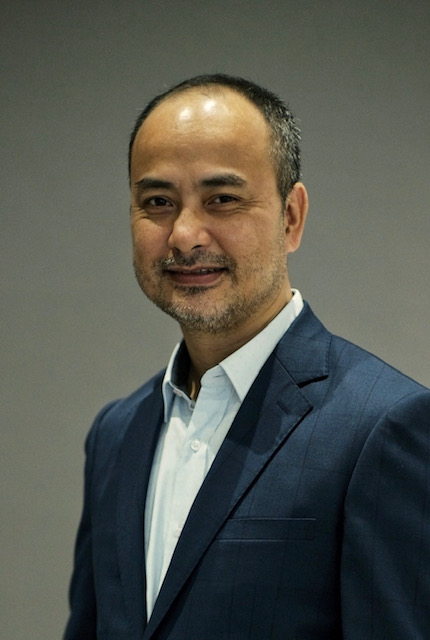
Ambassador Nguyen Trung Kien (Photo: Vietnamese Embassy in Austria)
WAJ: Ambassador, as I know, you were elected Vice President of the IAEA General Conference, 65th Term (2021-2023), in charge of multilateral relations between Vietnam and other countries at the United Nations in Vienna. What, in your opinion, are Vietnam's remarkable achievements in multilateral cooperation with other countries, particularly in the sphere of atomic energy?
Ambassador Nguyen Trung Kien: I appreciate your attention, and the years 2021-2023 have seen very positive activities on international forums for Vietnam. As we all know, Vietnam performed admirably as a Non-permanent Member of the United Nations Security Council. Furthermore, we were recently elected to the United Nations Human Rights Council, with our term beginning on January 1, 2023. Furthermore, I'm glad to inform you that there are numerous UN resident organisations in Vienna, and I have the honour of serving as Vietnam's Permanent Representative to these UN organisations. The United Nations Office, the International Atomic Energy Agency (IAEA), the United Nations Industrial Development Organisation (UNIDO), and the Comprehensive Nuclear-Test-Ban Treaty Organisation (CTBTO) are among the most important.
Vietnam will be actively and passionately involved in a variety of activities in 2022, and I can summarise the important elements as follows:
As Ambassador of Vietnam and Head of the Vietnamese delegation, I had the honour of being elected Vice President of the IAEA General Conference's 65th Session. Vietnam was also elected to the IAEA Board of Governors from 2021 to 2023. This board is a 35-member body in charge of setting policy for the International Atomic Energy Agency (IAEA). Furthermore, Vietnam retained the trust of the Comprehensive Nuclear-Test-Ban Treaty Organisation (CTBTO) member nations. Within the CTBTO, I was elected as the Chair of Committee A. Committee A is in charge of administrative, legal, personnel, and financial matters, and Vietnam is the Chair (for the 2021-2023 term); Committee B is in charge of technical issues, and the Ambassador representing the Republic of Kazakhstan is the Chair. These are the CTBTO's two most important committees.
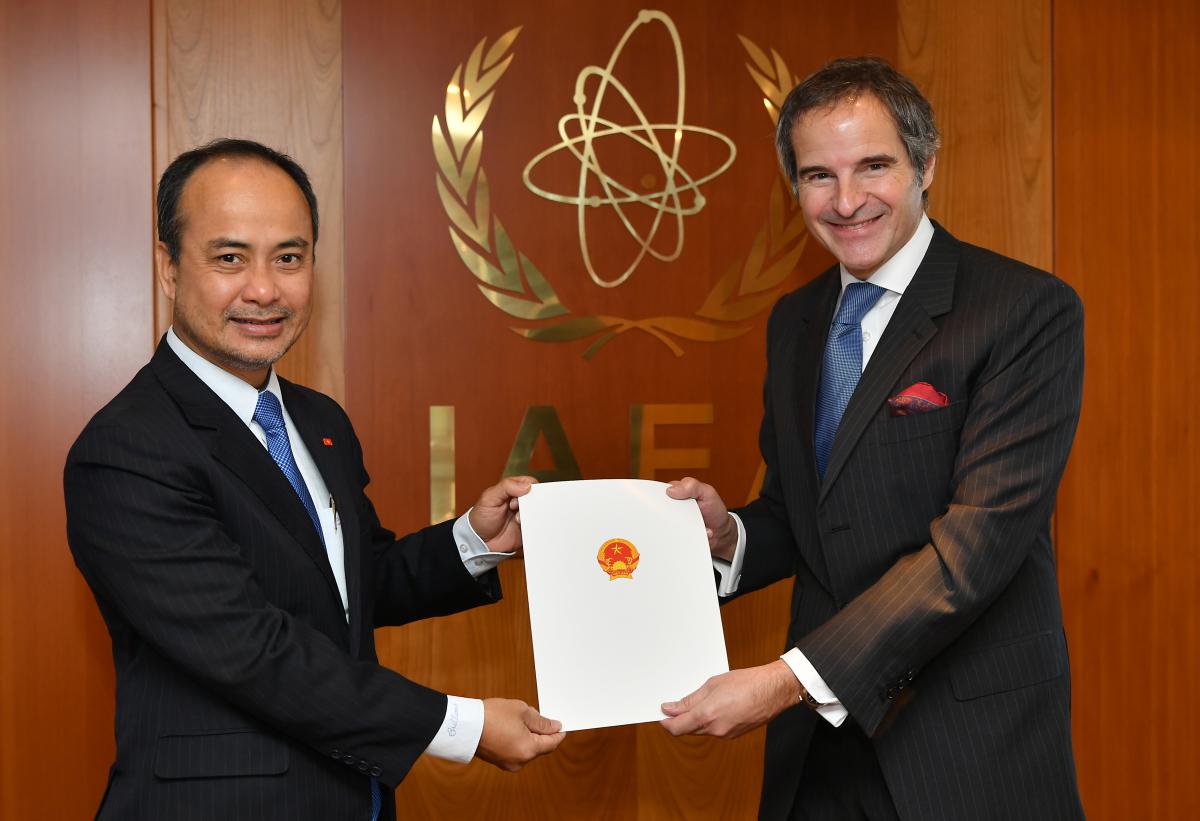
Ambassador Nguyen Trung Kien, Vietnam's Permanent Representative to the International Atomic Energy Agency (IAEA), presented his credentials to IAEA Director General Rafael Mariano Grossi (Photo: Vietnamese Embassy in Austria)
While the function of the IAEA Board of Governors has enormous weight, this is not the first time Vietnam has played it. However, Vietnam's appointment as Chair of Committee A of the CTBTO is the country's first in this capacity. Vietnam emphasises its desire, determination, and capabilities to contribute more positively to international diplomatic activities through these two positions. In a world facing countless changes, difficulties, and challenges, the importance of multilateral diplomacy becomes clearer - a foundation where states, despite differences and disagreements, seek common ground to protect peace, order, development, and security. Vietnam continually values multilateral diplomatic mechanisms and actively participates in them. Vietnam is taking up critical tasks in Vienna. In comparison to New York and Geneva, the forums in Vienna are more technical and commercial in character, with less emphasis on political, cultural, or social issues.
Comrade Nguyen Trong Nghia, Member of the Party's Central Committee and Head of the Central Committee's Commission for Publicity and Education, visited the IAEA's scientific research facility and met with the Executive Secretary of CTBTO in 2022, with the goal of improving mutual understanding between the two parties. Comrade Nguyen Trong Nghia is in charge of public relations and education, which includes scientific research. We sincerely hope that Vietnam will become even more actively involved in the IAEA, CTBTO, and other international organisations in Vienna, so that it can benefit from the values that multilateral mechanisms provide in terms of education and scientific research, while also contributing to these forums.
This year, as Chair of the Asia-Pacific Group at the IAEA, Vietnam presided over the group's ministerial conference and honoured the mechanism's 55th anniversary in Vienna. The IAEA praised this really positive activity. Furthermore, our operations aim to: first, assure global nuclear safety; and second, use nuclear science to support socioeconomic issues, agriculture, mining, healthcare, environmental protection, and nuclear science itself, presenting solutions to energy-related challenges. These are the areas where the IAEA works to add value to humanity, and Vietnam is a key player in these efforts.
We sincerely hope that the Vietnamese young would become more interested in the scientific values and practical applications of nuclear physics. Nuclear research, for example, can help in genetically modifying disease-causing insects, developing new crop types, improving cancer treatment through radiation therapy, advancing medical diagnostics, and helping to deep-sea mineral exploitation, among other things. These are extremely useful contributions that demonstrate cutting-edge scientific research capabilities. Vietnam is quite active in these domains.
In 2022, I was also honoured to represent a group of young Vietnamese scientists who were recognised by the IAEA for their achievements. Vietnam is making considerable progress as a developing country, with a special emphasis on the role of female scholars.
Finally, the United Nations Industrial Development Organisation (UNIDO) has its headquarters in Vienna, which is a hub for research. In 2022, Vietnam and UNIDO held extensive discussions and agreed that UNIDO will participate with and support Vietnam in drafting a national programme. This programme is important because it will assist Vietnam in assessing and planning comprehensive industrial development initiatives for the country over a 5-year period. Both parties have reached preliminary agreements, and we hope that they will soon move forward with actual efforts to jointly develop a national programme for Vietnam.
These are a number of initiatives brought to Vietnam by multilateral platforms and diplomatic efforts in Vienna.
WAJ: Austria is an important European export market for Vietnam. Following the official implementation of the Vietnam-European Union Free Trade Agreement (EVFTA) (on August 1, 2020 for the Trade Agreement/EVFTA, while the Investment Protection Agreement EVIPA is still awaiting approval from the parliaments of the EU's 27 member states), Vietnam has implemented several strategies to improve trade promotion in the Austrian market and, as a result, access the broader European market.
Ambassador Nguyen Trung Kien: Despite its small population, Austria has significant credibility in Europe. Many joke that if items are successfully introduced into the Austria, they will most certainly spread to neighbouring nations due to the prestige of the market and its key position within Europe. This is a distinct advantage. As a result, Vietnam values the Austria as both a final destination and a transit point into Europe. The EVFTA has produced tremendous value since its implementation. Despite the global economic upheaval caused by the Covid-19 pandemic and economic crises in 2020 and 2021, the pace of bilateral economic development between Austria and Vietnam has accelerated, exceeding Vietnam's overall growth rate.
However, we recognise that there are still numerous works to be completed. For example, as you have pointed out, in order for the Investment Protection Agreement (EVIPA) to become effective, each of the 27 European countries must ratify it. Austria has not yet ratified the Convention. Europe is currently confronted with several issues in politics, security, and the economy. As a result, the EU is failing to address its own difficulties, especially those originating from the migratory crisis. Austrian leaders are equally concerned about this. As a result, arguing for EVIPA's attention and ratification by European Parliaments, particularly the Austrian Parliament, will most certainly be challenging.
We believe that once EVIPA is granted, Austrian investors will benefit when joining the Vietnamese market. This is because they will be protected and given favourable treatment. Our mission, as well as that of Vietnamese enterprises, is to assist Austrian entrepreneurs in better understanding and focusing on Vietnam's potential market. When investors perceive those potential and benefits, they will become interested and push their parliaments to ratify the pact.
Currently, we will continue to organise activities that allow a deeper understanding between businesses on both parties, building on the sequence of business forums and exchanges between Vietnam and Austria, as well as neighbouring nations. Even Vietnamese businesses, particularly small and medium-sized enterprises, have insufficient awareness of the norms and circumstances of the European and Austrian markets. We will make every effort to provide a complete and attentive introduction to Austria's characteristics, benefits, regulatory requirements, and practises to Vietnamese firms, focusing on small and medium-sized enterprises.
In the coming year, we will strive to create opportunities that promote mutual understanding and increase engagement among firms on both sides. Currently, one of Vietnam's major diplomatic concerns is economic development. The Minister and Prime Minister of Vietnam frequently emphasise the importance of economic promotion in Vietnamese diplomacy. With a thriving commerce economy, parties will become more interconnected, laying the path for the development of all other sectors, strengthening mutual trust and collaboration in politics, and enabling deeper cultural interactions. We shall make every effort to foster economic cooperation as a foundation for the general development of numerous other activities.
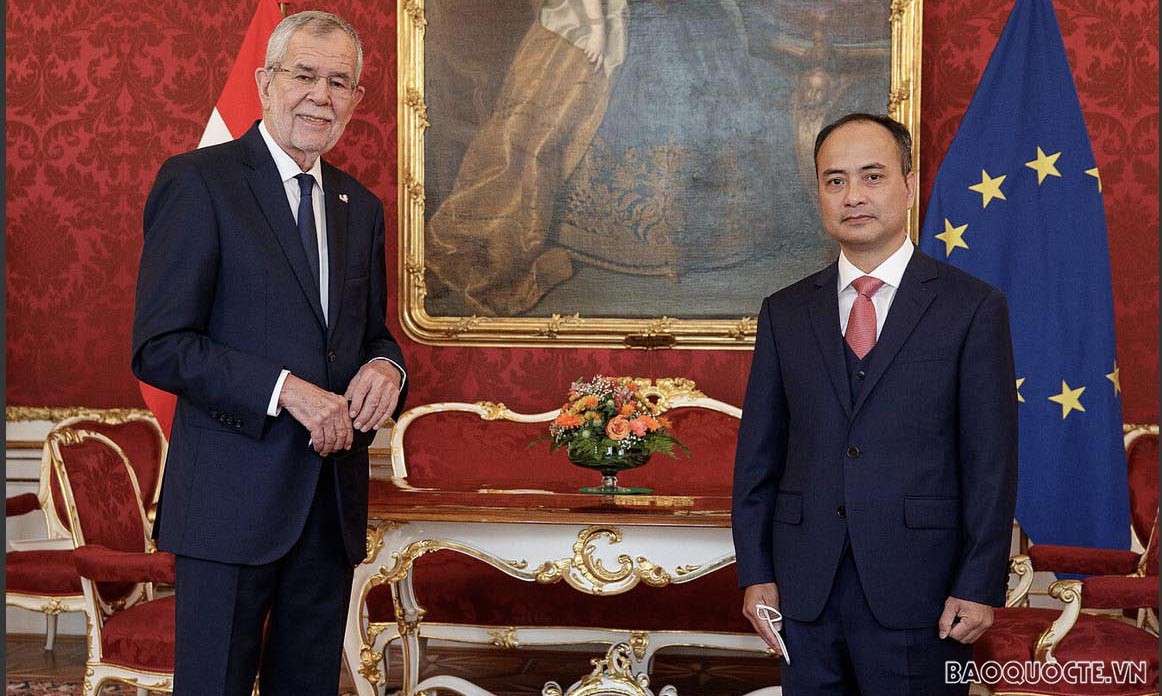
Ambassador Nguyen Trung Kien presented his credentials to President of the Republic of Austria, Alexander Van der Bellen (Photo: baoquocte.vn).
WAJ: Ambassador, prior to entering the diplomacy, you had substantial experience dealing with businesses, allowing you to appreciate the issues that Vietnamese enterprises face. With your abundance of knowledge, we believe your contacts will be successful when you take on your work in a Central European country like this. Furthermore, many experts from Austria and Vietnam have been supportive of good relations and scientific research between the two countries. However, no joint scientific awards have been given to them?
Ambassador Nguyen Trung Kien: Science, technology, and knowledge can be viewed as driving forces for development and are, in fact, societal growth goals. As a result, we consider that this is one of the obligations of any diplomat, not simply me as Vietnam's Ambassador to Austria. It is critical to encourage the growth of Vietnam's science, technology, and intellectual capacities in order to compete in the global scientific, technical, and knowledge landscape while also contributing to and reaping benefits.
We are thrilled to say that the VinFuture Prize was established in Vietnam last year. Although it is still in its early phases, I believe it has had a big impact by drawing scientific researchers to address urgent challenges of the day. I am certain that it will operate as a catalyst to stimulate scientific research in Vietnam and draw researchers from all over the world to this prestigious award.
Austria is a major European scientific research centre. Many Vietnamese scientists, I understand, have obtained training and participated in scientific research in Austria in biology, agriculture, and information technology. Many have returned to contribute to the scientific community in Vietnam, while others have continued their research here. These are certainly favourable outcomes. We have a responsibility to encourage, give chances for, and repeat such experiences. To accomplish this, scientists' efforts must be coordinated with those of educational and research organisations, as well as the dedication of scientists' work. There is still much to learn from Austria, particularly in terms of ensuring that scientific research becomes more practical, closely integrated with, and beneficial to daily life. Austria has had a lot of success in this area. Vietnam must try to embrace procedures and traditions that stimulate, support, and foster scientific research in order to truly contribute to socioeconomic growth through practical applications.
WAJ: During your tenure, which specific objectives did you plan to pursue aimed at boosting bilateral relations between Vietnam and Austria, as well as multilateral connections between Vietnam and other nations?
Ambassador Nguyen Trung Kien: As a diplomat, the position entails a wide range of works and obligations. Significant tasks include participation in national and international activities involving numerous countries. There are, however, lesser, simpler jobs, such as meeting with and explaining minor difficulties to inhabitants of one's own country, assisting in the resolution of a question in the designated area, encouraging connections between individuals, or fostering better mutual understanding between parties. These tasks are also part of a diplomat's responsibilities.
With a three-year diplomatic term, I don't have high hopes, given my limited capabilities and the magnitude of the job. Nonetheless, I've established certain personal objectives for myself in terms of these responsibilities, such as:
To begin, it is to continue to improve Austrians' understanding of Vietnam—its people, history, culture, strengths, and shortcomings. In turn, I hope to help Vietnamese people better understand Austria—the country, its people, society, and the accomplishments of both sides. Although this is a common responsibility that does not belong to any one person, I am simply following in the footsteps of my 9 predecessors as Ambassador, contributing my own tiny contributions to the long-term journey. I don't have lofty goals; the achievements that each of us achieves are built on the foundation laid by those who came before us.
Second, I want to give Vietnamese diplomacy with a positive direction. According to my observations and visits, many people around the world recognise and admire Vietnam for its bravery, for the gallant battle that led to independence and for defending that independence. But, what should Vietnam do now to sustain its development? A new Vietnam which is known around the globe for its cultural beauty, natural appeal, the good qualities of its people, and the potential for peace and progress. We will never forget our heroic achievements in the past, but we must also look forward.
Third, we are already halfway through the three-year term of my assignment, and I hope to complete the specific diplomatic operations entrusted to me by the Party and the State of Vietnam. The Austrian Minister of Foreign Affairs is expected to visit Vietnam in the second quarter of this year. Iand the Austrian Ambassador in Hanoi are cooperating to guarantee Mr. Alexander Schallenberg's visit is successful and fruitful. He will be accompanied by a delegation of Austrian companies to engage in trade talks with Vietnam. In 2023, there will be a series of activities in Austria involving delegates from Vietnam, mainly from provinces and municipalities. We will work hard to ensure that these visits from Vietnam are as effective as possible. It is not just about holding fruitful meetings and exchanges, but also about producing results that benefit the relationship and socioeconomic progress. Finally, I'd want to emphasise that humanity is at the heart of international relations and inter-national relationships. I expect to see deeper and broader links between Vietnamese and Austrian communities. During the remainder of my mandate, I hope to strengthen links between Austrian regions, cities, and institutions with those in Vietnam.
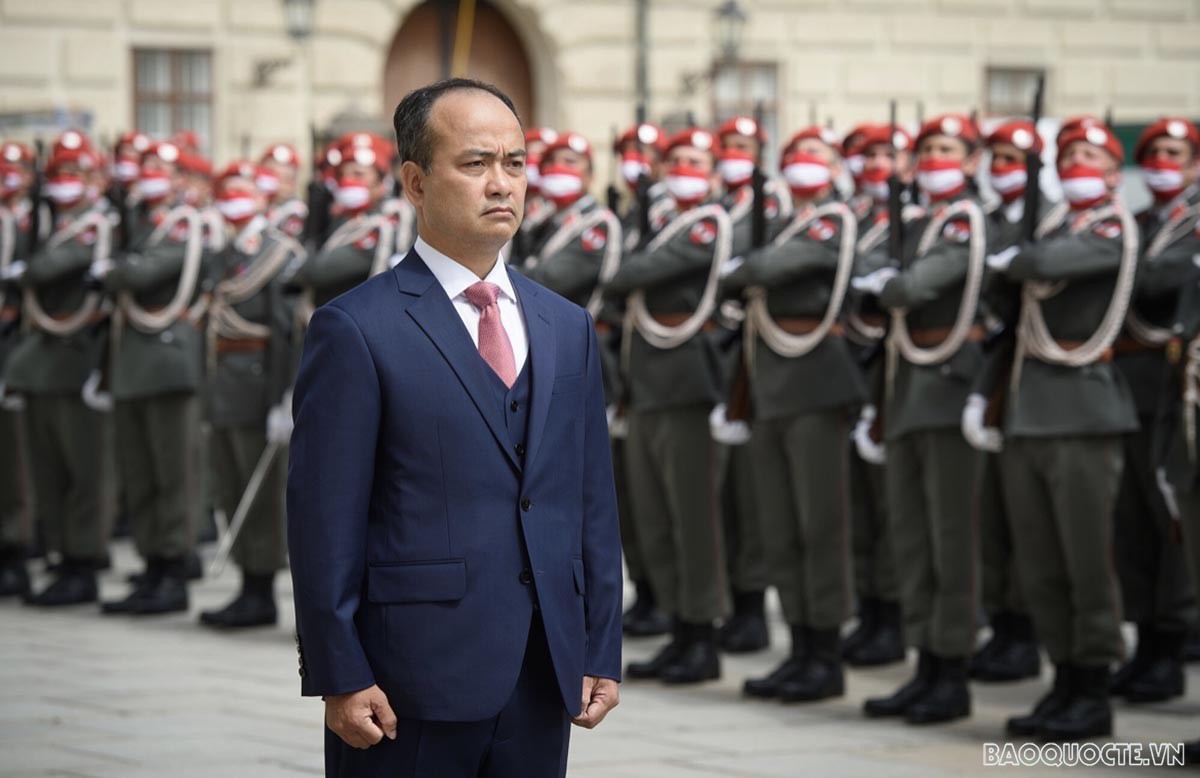
Ambassador Nguyen Trung Kien presented his letter of credentials at the Hofburg Palace (Photo: baoquocte.vn).
WAJ: This year, your second year you and Vietnamese Embassy organised the Lunar New Year, bringing joy and harmony to the Vietnamese community. What are your thoughts about Vietnamese community in Austria?
Ambassador Nguyen Trung Kien: The pandemic has indeed interrupted trade and hampered human contacts over the last three years. As a result, we were unable to celebrate the Lunar New Year in 2021, and instead, a modest meeting was held within the terms permitted by the local authorities. As society returns to normalcy in 2022, we hope to organise a larger Vietnamese community gathering in Austria to say goodbye to the old and welcome the new year.
In absolute terms, the Vietnamese community in Austria is not so big. However, as compared to the host country's population, the Vietnamese and Vietnamese-origin minority is not insignificant. I've noticed that the Vietnamese community in Austria has a distinct edge over many other communities in that they have had reasonably good integration into Austrian society. The majority of the community members today live stable lives and are legal residents. This is an important point to consider because many Vietnamese communities abroad have difficulties to assimilate into their new societies, with some individuals still dealing with legal status.
By working with local authorities, I've noted that the local government has high regard for the Vietnamese people. Some state governors and mayors have expressed their gratitude, claiming that the Vietnamese community has integrated well in comparison to other immigrant communities in Austria. They have a strong sense of oneness, participate positively, assimilate culturally, and contribute significantly to Austrian society. They also do not cause problems for local governments in terms of legal or security considerations.
Vietnamese cuisine and a network of restaurants showcasing Vietnamese culinary traditions are developing in Austria, particularly in Vienna, the capital city. Vietnamese restaurants have effectively blended into Austrian culture while retaining original Vietnamese flavours. This is an encouraging development.
The Vietnamese community in Austria is currently relatively united, with several organised groups, including the Vietnamese Community Association in Linz, the Hai Phong Origin Vietnamese Community in Vienna, the Vietnamese Women's Association in Austria, and the Vietnamese Student Association in Austria. These are cohesive and close-knit organisations that contribute to the community's development. However, I hope that future Vietnamese generations living in Austria would work to maintain their cultural traditions and the Vietnamese language. This is the obligation that falls upon the Embassy, parents, and leaders of Vietnamese communities in Austria. I think conserving the Vietnamese language and culture are the common goal that we must strive for because only by doing so can the Vietnamese community continue to unite, safeguard each other's interests, and uphold the Vietnamese cultural identity both at home and abroad. It is critical to maintain the Vietnamese essence among persons and their way of life.
WAJ: I would like to send greetings for the Tet Holiday to the overseas Vietnamese community.
Ambassador Nguyen Trung Kien: I'd like to share that in Europe in 2022, we witnessed various crisises such as pandemic, conflict, difficulties, energy shortages, rising consumer costs, and economic stagnation. We have seen an increase in business interest in the Asia-Pacific region, especially Vietnam. Significant advances in science and technology, particularly in information technology, have fundamentally impacted society life. In the end, though, we must return to the most fundamental qualities of humanity.
I wish everyone a peaceful year, 2023! Today, as we are sitting here and talking together, and in just over two weeks we will enter a very important commemorative year - the 50th anniversary of the Paris Peace Accords. This landmark represents a legal turning point towards peace, bringing an end to the protracted Vietnam War and its devastating implications for Vietnam. When the Paris Peace Accords were reached in 1973, they opened up new possibilities and brought peace to Vietnam. Therefore, given the current global setting, my first want and hope is for the entire community, all of us, to experience peace. This is the basis for a full and prosperous life. Second, I hope for everyone to be well-fed, warmly clothed, and happy, as President Ho Chi Minh once said. Given the current conditions, I believe President Ho Chi Minh's earlier aim for a life of prosperity and happiness is still true.
Thank you very much Ambassador!
Vienna, 6/01/2023
PROMOTED
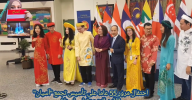
Austria news - Usama Nosshy channel covers Asean's 55th anniversary celebrations at the United Nations in Vienna
WAJ- Young translator conquers the ancient Greek classic Anabasis – Memoir of the Persian Expedition
- Austria news - Usama Nosshy channel covers Asean's 55th anniversary celebrations at the United Nations in Vienna
- VietnamPlus Newspaper reported about ASEAN's 55th anniversary at the United Nations in Vienna
MOST VIEWED
The two Kings Philippe and Van der Bellen havedifferent backgrounds, one is of royal origin, and the other is a child of a refugee family (once of noble origin) but now, in the eyes of the European public, both of them are giving off a sense of courtesy, virtue and erudition.
WAJWith the attendance of many international figures, the 80th anniversary of the end of World War II was celebrated at the United Nations headquarters.
Journalist Usama Soliman

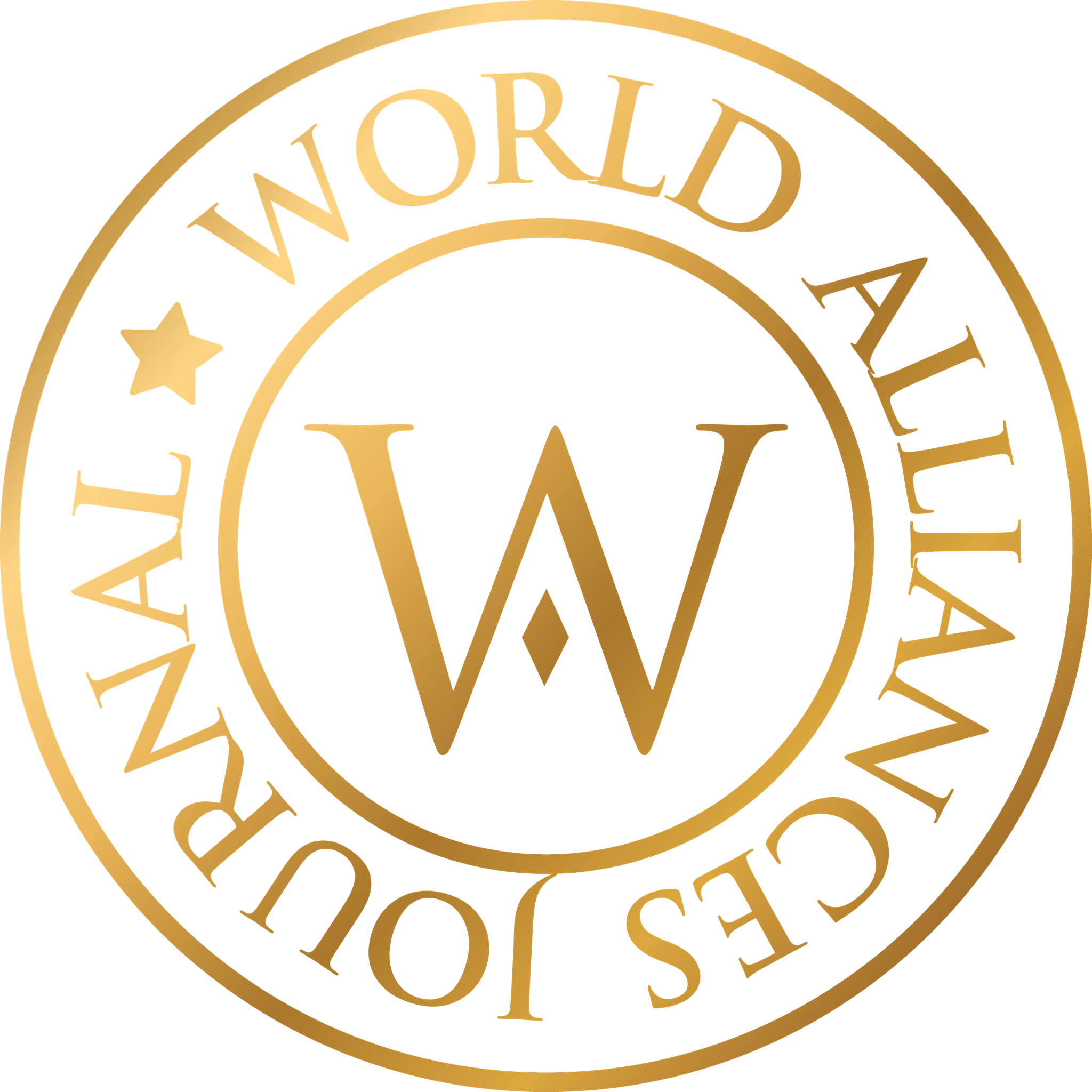
.jpg)
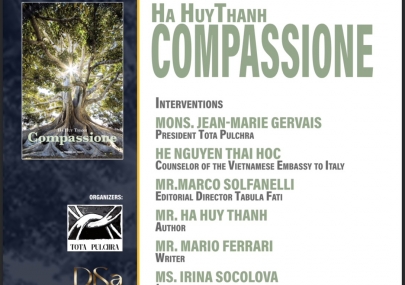
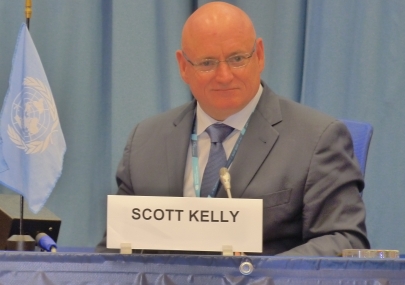
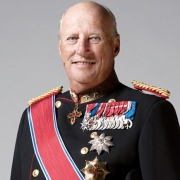
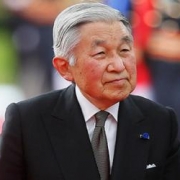
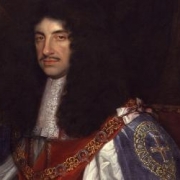
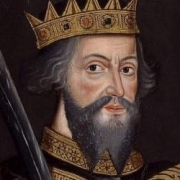







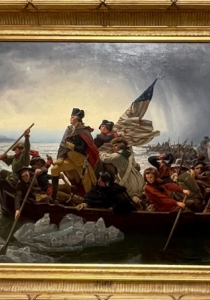
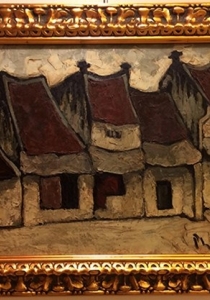

Comment